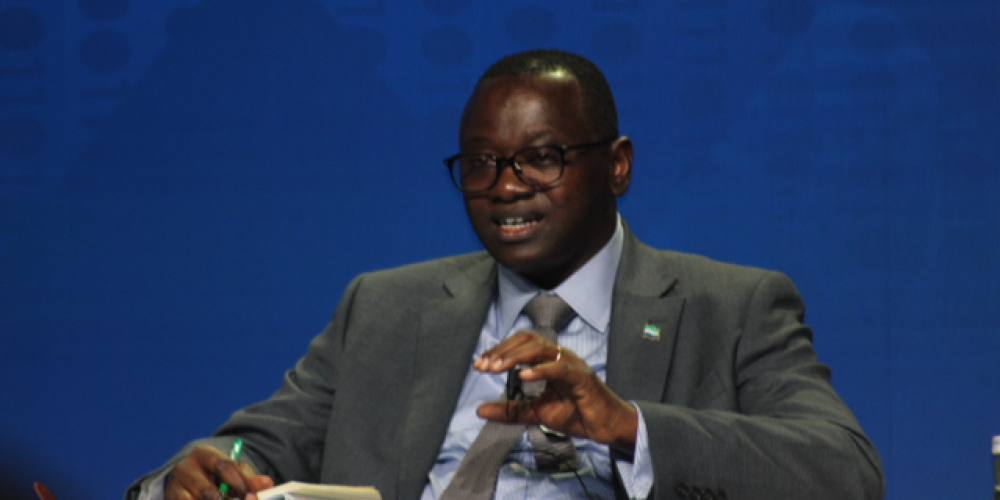By Expo Times Reporter
In response to a question on what the International Monetary Fund (IMF) can do to make Africa’s capacity development effective, Minister Sheku A.F Bangura identified the continent’s absorptive capacity and financial constraints as two issues that will add value for effective implementation.
At the Annual Meetings in Marrakech, Morocco, he spoke during the High-Level Capacity Development Talk on “Building Capacity for Africa’s Economic Empowerment amidst Compound Shocks” on Tuesday, 10thOctober, 2023.
Expanding on Africa’s absorption capacity, he said that a few officials in our countries with fragile and weaker institutions deliver training in different sectors.
These officials, he said, undertake a variety of tasks. As a result, they have to ensure that the funds carefully prioritise support to these countries to impact in a way that not only absorbs but can implement the training provided.
“Prioritisation with our partners is critical, so we do not bunch technical assistance (TA) on them.
TA is coming from many institutions, even in the Fund. It is vital that it is targeted and step-staged,” he said.
On the financial constraint, Minister Bangura talked about the cost implication of implementing specific reforms in which the support provided will require investments.
He said Some reforms will require support in the form of hardware to back up some of the necessary support, noting that if they are not adequately planned for, then it undermines the effectiveness of utilising the training or support provided.
In her intervention on the questions, Caroline Abel, Governor of the Central Bank of Seychelles, highlighted the proximity issue, which she says has increased as they can now access those facilities because when they started, they had to send staff to Washington.
That she said was becoming a problem, but getting the centre close to them in Mauritius has been helpful as they sent more staff for training, and the virtual system also helped a lot.
She added that the IMF has become more engaged in understanding the realities on the ground.
She recalled that when they started in 2008, that was a critical component, such that the country authorities felt that the Fund needed to understand the issues on the ground, making discussion challenging.
Similarly, on how the country could use the support provided by the Fund to help achieve milestones, Minister Bangura replied that a lot happened in the space both on the monetary and fiscal side and other institutional architecture.
The capacity building received from the Fund and World Bank, he said, broadly touched on large areas that have to do with economic public financial management within the Central Bank and the Ministry of Finance.
He continued by stating that, whether it has to do with tax issues, expenditure management, or central banking, there are also legal frameworks that cover these areas so that they can ensure that the institutions are strengthened.
In the current context, Minister Bangura noted that it is crucial for this kind of support to African countries. Moving into the area of taxation, Sierra Leone, he said, does their tax policies on an annual basis, which is a challenge, as most of their engagements with corporate businesses need more predictability.
The recent engagement with the Fund, Mr Bangura stated, has led the government to start looking in the medium term, thereby designing tax policies and measures that provide predictability for businesses, which will help them plan effectively into the way the government is thinking in mobilising the revenues required to respond to development needs.
Minister Bangura highlighted the issue of expenditure management, where they have seen difficulties. “It is not just beyond planning the budget and the like but ensuring that you have efficiency, measures in ensuring that there is efficiency and effectiveness in utilising existing resources within the limited space and showing that we understand how to utilise these limited resources to be able to respond to bigger demands that are out there,” he said.
He underscored the holistic nature of capacity building, including the need to update laws to align with recent developments. He also discussed the importance of building resilient institutions to address climate-related challenges and leverage opportunities for climate finance.
In conclusion, Minister Bangura’s insights into Sierra Leone’s successful partnership with the IMF and the World Bank underscore the critical role of capacity building in fostering economic development and resilience.
Copy right –Printed in the Expo Times Week end Newspaper on Friday 13th October, 2023 (ExpoTimes News – Expo Media Group (expomediasl.com)





